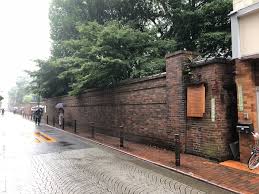Since yesterday I'm struggling with this sentence:
六義園と言えば、そばに住むようになって三年ほど経ったその頃には、なかに入ってはじめて見ることができる庭園の手入れの行き届いた芝生の明るさよりも、塀際の、伸びるままにまかせている雑木の暗い木立しか、思い浮かべられなくなっていた
I kinda get the first part, at least its general meaning, but I'm at a loss with the last part, 伸びるままにまかせている雑木の暗い木立しか、思い浮かべられなくなっていた.
The first part is saying that after three years living near 六義園 the character doesn't really notice the cheerfulness of the well-cared garden; here I don't really get はじめて見ることができる, which literally should be "Being able to see for the first time", but using the translation it seems to be referring to people seeing it for the first time, so "Unlike peope seeing it the first time, I don't really notice...".
The second part...
塀際I think means that whatever she is speaking about is on the side of the wall;雑木の暗い木立しか、思い浮かべられなくなっていたmeans she is reminded just of the dark grooves of different trees;伸びるままにまかせている...伸びるis "To stretch",ままにis "As; Wherever" (orまま+に?), and forまかせているI just found任せる, which I really don't get what should mean in this sentence. I'm not even sure I parsed it correctly.
I tried some search on Weblio, but I can't find any form like those. I roughly know what it means from the given translation ("the dark tangles along the walls"), but it seems to me there is more going on.
The translation given in the book is: "By that time we'd been in the discrict for three years, and the name 'Rikugien' brought to mind not the tidy, sunlit lawns seen by visitors, but the dark tangles along the walls".
Edit: I removed a part of the question I left by mistake.

